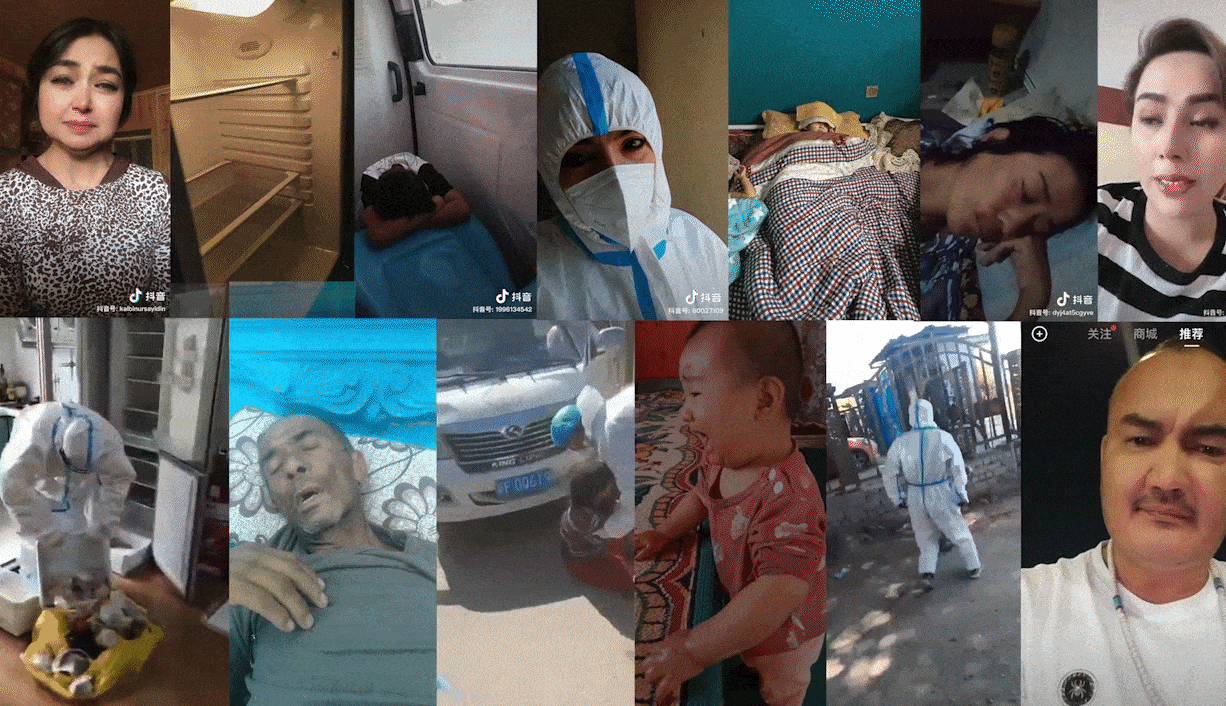At least 22 people died of starvation or lack of medical attention on a single day last week under China’s COVID lockdown policies in the northern Xinjiang city of Ghulja, RFA has confirmed with police and bereaved family members.
Appeals for help from Uyghurs trapped in quarantine under Beijing’s zero-COVID measures are popping up on Chinese social media platforms.
Their suffering has been highlighted by the Uyghur diaspora as they agitate for international action against China’s heavy-handed assimilation campaign in the minorities in the Xinjiang Uyghur Autonomous Region (XUAR).
Uyghurs are demanding that the United Nations, convening in New York this week, take action on a damning report by the UN human rights chief that said China’s arbitrary detention and repression of Uyghurs and other Turkic minorities in Xinjiang “may constitute international crimes, in particular crimes against humanity.”
U.S. President Joe Biden listed the crackdown in Xinjiang among global rights violations in his address to the UN General Assembly Wednesday.
Ghulja (in Chinese, Yining), a city of roughly a half-million mainly Uyghurs and other Turkic Muslims, has been under lockdown since early August, prompted by outbreaks of COVID-19. RFA has previously reported deaths from starvation or lack of access to medicine in Ghulja.
Last week, more than 600 mostly young Uyghurs from a village in Ghulja were detained by authorities in Xinjiang after they ignored a strict COVID-19 lockdown and staged a peaceful street protest against a lack of food that had led to starvation and deaths.
Videos posted by desperate Uyghurs on Chinese social media platforms—and quickly deleted by government censors—show local people under strict “zero-COVID” lockdowns struggling to access food and medical care, with some saying family members had starved to death.
China’s uncompromising zero-COVID lockdown and mandatory testing policies, which have also caused suffering in Tibet and in many eastern Chinese cities, add another layer of oppression for the 12 million Uyghurs.
The Uyghurs have long endured extensive high-tech monitoring, repressive re-education policies and arbitrary incarceration under what China says is a campaign to combat extremist violence, but which some Western governments describe as genocide.
The report issued on Aug. 30 by U.N. High Commissioner of Human Rights Michelle Bachelet covers the period during which Chinese authorities arbitrarily detained up to 1.8 million Uyghurs and other Turkic minorities in internment camps in Xinjiang, according to numerous investigative reports by rights groups, researchers, foreign media and think tanks.
The predominantly Muslim groups have also been subjected to torture, forced sterilizations and forced labor, as well as the eradication of their linguistic, cultural and religious traditions, in what the United States and several Western parliaments have called genocide and crimes against humanity.
China rejected the UN report as “based on the disinformation and lies fabricated by anti-China forces.”
In the three weeks since Bachelet issued the report, U.N. rights experts and Uyghur groups have stepped up calls for concrete action from the international community, including setting up a U.N. Human Rights Council panel and a special envoy on Xinjiang abuses and steps by member states and businesses to hold China accountable.
Remarks on Xinjiang by Biden, and by German Chancellor Olaf Sholtz, were welcome, “but certainly not enough stop the ongoing genocide,” said World Uyghur Congress President Dolkun Isa.
“We ask the U.N. member states to activate the U.N. mechanism to investigate the genocide and the U.S.-led free world to call for the passage of a U.N. resolution to condemn China’s ongoing genocide.”
In Washington this week, the Uyghur American Association (UAA) are staging a hunger strike in front of the White House by leaders of the advocacy group and by three internment camp survivors: Uyghurs Zumret Dawut, Tursunay Ziyawudin and by Gulzire Aulkhan, an ethnic Kazakh.
“First, we’re deeply disturbed by the photos and videos coming out of our homeland, especially from Ghulja. China’s communist government is using COVID as a pretext to lock down our people in their homes and continues its genocide. We want to bring attention to it,” said UAA President Elfidar Iltebir.
“Second, there hasn’t been any meaningful actions taken after the publication of the U.N. report on Uyghurs,” said the activist, who camped overnight near the White House.

